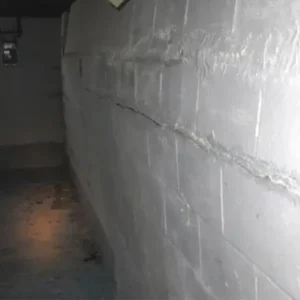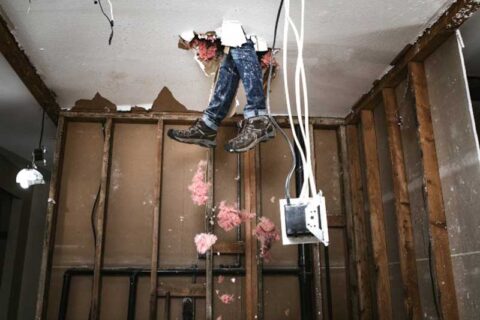Bulging Walls Are a Sign of Foundation Issues
 Your home’s foundation does the heavy lifting. After all, it supports the entire structure of your house, keeping you and your family safe. But what happens when signs of trouble begin to surface? Bulging or bowing basement walls is one of the most concerning signs of foundation problems. If you’ve noticed this in your home, acting quickly is essential. Ignoring foundation issues can lead to costly repairs, structural damage, and a reduction in your home’s value. Learn more about why bulging walls occur from Milwaukee, WI’s leading foundation specialists.
Your home’s foundation does the heavy lifting. After all, it supports the entire structure of your house, keeping you and your family safe. But what happens when signs of trouble begin to surface? Bulging or bowing basement walls is one of the most concerning signs of foundation problems. If you’ve noticed this in your home, acting quickly is essential. Ignoring foundation issues can lead to costly repairs, structural damage, and a reduction in your home’s value. Learn more about why bulging walls occur from Milwaukee, WI’s leading foundation specialists.
What Causes Walls to Bulge?
Bulging walls occur when structural and environmental pressures overpower the wall. This can occur for any number of reasons, including the following:
Excessive Hydrostatic Pressure
Hydrostatic pressure happens when water from rain, snow, or plumbing leaks accumulates in the soil surrounding your home. Over time, this water-soaked soil begins to press against your foundation walls. If the pressure grows too strong, your walls may bow or bulge inward. Look for these warning signs if you suspect hydrostatic pressure is causing basement wall bulging:
- Water pooling around your home after rain
- Cracks in basement walls
- Musty odors
Poor Soil Quality
Poor soil composition is another common contributor to foundation bulging. Expansive soils like clay shrink and swell dramatically based on moisture levels, putting constant pressure on your foundation walls. If your foundation cracks near doors and windows, it could be a problem with soil quality.
Structural Wear and Tear
Wear and tear naturally occur over time, no matter how well you care for your foundation. Be sure to watch for these age-related problems and reach out to Everdry Waterproofing of Wisconsin as soon as possible:
- Crumbling mortar between bricks or blocks
- Gaps where walls meet floors or ceilings
- Visible wall deformation
Tree Roots
While trees enhance your property’s curb appeal, their underground roots can spell disaster for your foundation. Roots searching for moisture can grow toward your foundation and exert pressure, leading to bulging walls in the house. In addition to curved walls, tree roots can cause uneven floors and visible cracks in exterior walls.
Heavy Driveways
Homeowners often don’t realize just how heavy driveways made of brick or concrete are. The weight of the material presses into the ground. If the driveway is constructed too close to the building’s foundation, it can cause bowing basement walls.
Lawns Sloping Toward Foundation
The grading of the landscape around the foundation is important when it comes to determining the direction in which water will flow. If the lawn around the home slopes towards the foundation of the home, water will flow toward it. Without proper attention, the excess water will increase hydrostatic pressure against the basement walls and cause bulging.
Bulging Walls Are a Bigger Issue Than You May Think
Bulging walls aren’t just cosmetic concerns—they’re one of the clearest signs of underlying foundation problems. What starts as a bulging wall can quickly spiral into bigger issues without expert foundation repair. Potential consequences include:
- Structural Damage—Continued strain on your foundation can cause extensive cracking or uneven floors. Eventually, structural damage can make your home dangerous to live in.
- Water Damage—Foundation damage often creates entry points for water, which can lead to mold and mildew growth. Our team can conduct an assessment if you’ve noticed musty smells or visible mold on ceilings and walls.
- Decreased Home Value—Homes with visible foundation issues are less appealing to buyers and often require price reductions. If you ever plan to sell your home, it’s a good idea to get ahead of foundation problems.
When to Call a Professional
Bulging walls are not something homeowners should attempt to fix on their own. Without proper tools and expertise, you risk making the problem worse or injuring yourself. Call a foundation repair expert as soon as you notice bulging basement walls, water intrusion, or other warning signs. Foundation repair specialists have the knowledge and equipment needed to diagnose and resolve the issue effectively. Their help could save you thousands of dollars and prevent further damage down the line.
How Much Does Bowed Basement Wall Repair Cost?
Too often, homeowners put off bowed basement wall repair because they’re worried about the cost. The truth is that repair costs are far lower than the price of rebuilding your entire foundation. It’s impossible to estimate the repair cost accurately without evaluating your specific circumstances, but generally speaking, a minor bulge in the foundation wall might only cost a few hundred dollars. Significant damage, however, could range from $5,000 to $15,000.
Repairing a Buckling Foundation Wall
If caught in time, basement foundation repair can be a simple job. But if you wait until the later stages, our repair experts may ask you to leave your home while we fix the bowing basement wall. Don’t worry, though—you can count on our experienced technicians to restore structural integrity with industry-standard repair techniques. We may use the following approaches to get your basement walls back to normal:
- Carbon Fiber Sheets—Carbon fiber sheets reinforce the wall and help it resist and redistribute outside pressure evenly.
- New Drainage Systems—Proper outdoor drainage prevents water from absorbing into the soil next to the foundation and relieves pressure on the wall.
- Wall Braces—Wall braces are an engineered steel option that we anchor in place. Over time, we’ll slowly adjust them to ensure the wall is aligned correctly.
- Carbon Fiber Staples—In some cases, we’ll fill cracks by injecting filler material and cross-stitching with carbon fiber staples.
- Helical Ties—If your walls are severely damaged, we typically use helical ties combined with carbon fiber reinforcement to resist soil pressure and pull the walls into proper alignment.
How Long Do Foundation Repairs Last?
When done correctly by professionals using high-quality materials, foundation repairs should last for many decades or even a lifetime. Preventative measures like waterproofing and soil stabilization can also prolong repairs. Talk to our team for tips on how to ensure your foundation stays in top shape.
Protect Your Home by Acting Today
If your basement walls are bowing inward, you could have a major problem on your hands. Foundation repair should never be procrastinated, as these issues can put your safety in jeopardy. But there’s no need to panic—Everdry Waterproofing of Wisconsin is here for all your foundation repair needs. We’ll get to the bottom of the issue and suggest a fix. Contact our Milwaukee team today to learn more about how we can help.
Ready to Get Started?
Contact Us Today to Schedule a No Pressure, No Obligation, Free Quote!


